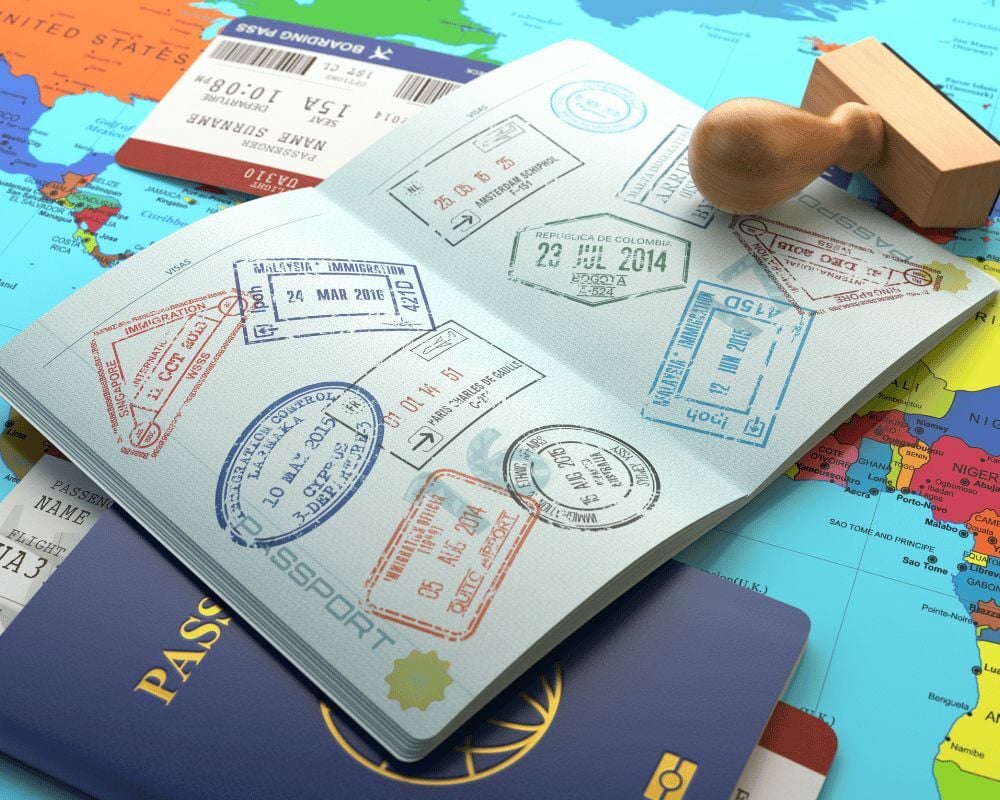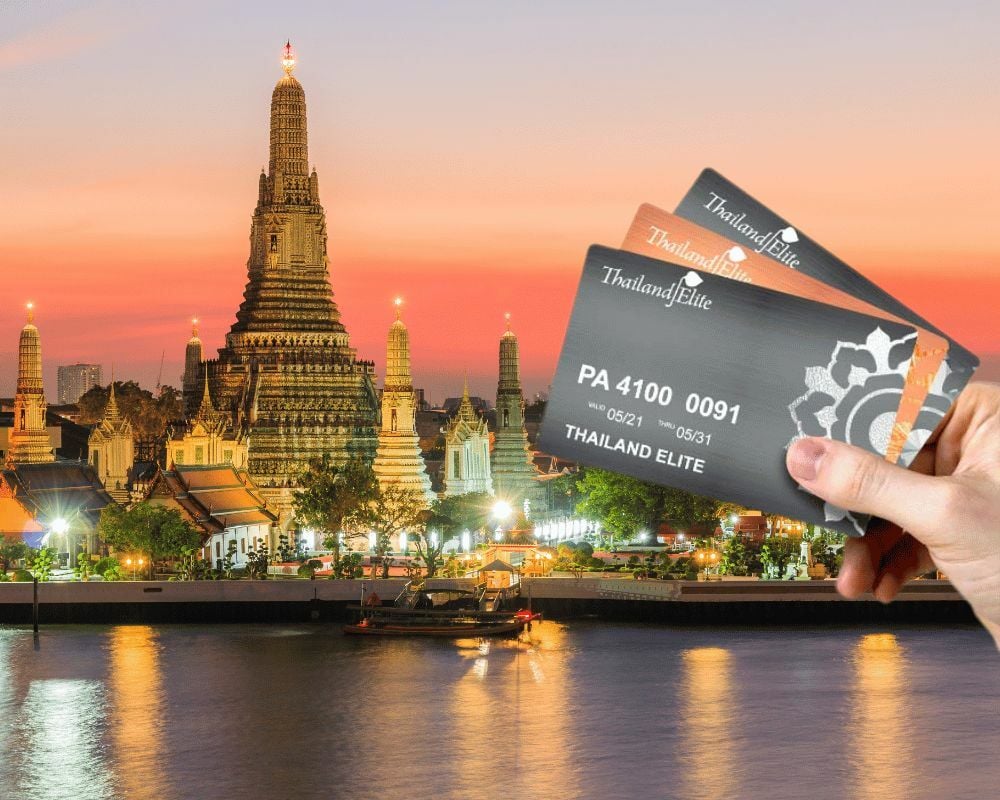An Overview of the DTV
Designed for digital nomads, remote workers, and long-term visitors, the DTV is valid for five years and allows multiple entries. Each entry permits a stay of up to 180 days. The visa allows remote work for overseas employers but does not permit employment with Thai companies.

What is a Destination Thailand Visa?
Thailand’s Destination Thailand Visa (DTV) is designed for remote workers and long-term visitors seeking extended stays for work or cultural immersion. Unlike standard tourist visas, the DTV is valid for five years and allows multiple entries, with each stay lasting up to 180 days.
Holders may work remotely for overseas employers and may apply to extend each stay for a further 180 days, subject to immigration approval.
The visa is well-suited to digital nomads, freelancers, and long-term visitors interested in cultural activities such as Muay Thai training or Thai cooking courses. Eligible applicants may also bring immediate family members, including a spouse and dependent children under 20, provided they meet the relevant visa requirements.
What Are The Eligibility Criteria?
To be eligible for the Destination Thailand Visa (DTV), applicants must meet the criteria below. Requirements are subject to change, and this page is updated when official guidance changes.
Age Limit
Applicants must be at least 20 years old.
Visa Fee
The DTV costs 10,000 Thai baht. Each stay may be extended once for up to 180 days, subject to approval and an additional fee.
Finance
Applicants must show proof of sufficient funds to support themselves during their stay. Current guidance suggests having at least 500,000 Thai baht in savings, though requirements may vary by embassy.
Application
Applications must be submitted outside Thailand through a Royal Thai Embassy, Consulate, or the official Thai e-Visa system. Required documents vary by location but typically include proof of finances and remote work or long-term activity.
Health Insurance
Health insurance requirements for the DTV may vary. Applicants are strongly advised to have valid health insurance covering their stay in Thailand.
Other Important Information
Before applying for your DTV, it is important to understand the points below.
Customer Ratings
4.1/5
40 reviews
Customer Reviews
2/6/2024
This website is a lifesaver! I had so many questions about the DTV visa, and the staff responded to my inquiries almost instantly. They were incredibly helpful and informative, putting my mind at ease.
Sarah Wilberg
2/6/2024
I am really impressed by the fast and friendly communication with the staff here! They were super patient with all my questions
John Lake
10/6/2024
Big thanks to the team for the quick response and clear explanation
Anya Stuate
7/6/2024
They were super helpful in clarifying the difference between the DTV and other Thai visas.
David Johnson
9/5/2024
I had a minor concern about the DTV income threshold, and they addressed it right away. Great service!
Emily Oflane
9/6/2024
Really appreciate the website’s commitment to clear communication. The staff answered all my questions promptly and professionally, making it easy to understand the DTV program.
Lala Kim
11/6/2024
I wasn’t sure if the DTV visa was right for me, but the staff helped me understand the benefits and eligibility criteria in no time.
Ben Cela
13/6/2021
Just a quick shout-out to the fantastic staff here! Their quick responses and clear explanations have made a huge difference in navigating the DTV visa process.
Daniel Role
How The Thaiger Helps You Navigate the DTV Process
The Destination Thailand Visa (DTV) is now available through official Thai government channels. The Thaiger provides guidance and up-to-date information to help readers understand the process and prepare their applications correctly.
Guidance for applying for the DTV
Our team helps expats and long-term visitors understand DTV requirements, eligibility criteria, and key steps involved in the application process before applying through official channels.
Contact us for professional support in obtaining your Thailand Destination Visa
Key Features:
-
- Comprehensive application support
- Guidance on completing the DTV visa application
- Assistance in gathering required documents, including financial proof
- Seamless submission process
- Managing the submission of your application to Thai authorities
- Continuous tracking and updates on your visa status
- Interview and Requirements Navigation
- Preparing for any necessary interviews with immigration officials
- Advising on meeting the financial and health insurance requirements
- Post-approval assistance
- Support with post-visa approval steps, including long-term stay planning
Note: Visa applications must be submitted directly through Royal Thai Embassies, Consulates, or the official Thai e-Visa system.
Thailand’s DTV visa lets you redesign your life for up to five years.
Unlike retirement extensions, the DTV offers the advantage of multiple entries throughout its five-year validity. No need for a separate re-entry permit!
Enjoy the flexibility to travel in and out of Thailand as you explore new destinations or visit family, all under the convenience of a single DTV visa.
Destination Thailand Visa Requirements
Thailand’s Destination Thailand Visa (DTV) is designed for remote workers and long-term visitors seeking extended stays in Thailand.
1. Age: Applicants must be at least 20 years old.
2. Finances: Applicants must demonstrate sufficient financial means to support themselves during their stay in Thailand. This is typically shown through a bank statement indicating funds of around 500,000 Thai baht or proof of regular income from overseas sources, depending on embassy requirements.
3. Employment: The DTV is intended for remote workers and freelancers working for overseas employers or clients. Applicants are generally expected to provide evidence of remote employment or overseas income. Employment with Thai companies is not permitted under this visa.
If you have any questions regarding the above, please join and ask our Thaiger Talk forums.
Get clear, up-to-date information on the Destination Thailand Visa with The Thaiger
Related Services for Future Destination Thailand Visa Holders
The Thaiger offers numerous services so you can have a nice and relaxing life in Thailand. We are here to provide you. Please check the information below for related services to support your life in Thailand.
Health Insurance
Shield yourself from the unexpected in the circumstance of any health issues or illnesses. Check out what health insurance covers and how it prevents you from having to pay the entire cost of medical care if you get injured or sick.
Motoring Insurance
Ensure complete protection with our comprehensive car and motorbike insurance, covering accidents, theft, and natural disasters on all your journeys.
Drone Insurance
Secure your flights with drone insurance, covering damages and liabilities from unexpected accidents, malfunctions, or loss of control.
Personal Accident Insurance
Personal Accident Insurance provides financial protection against unforeseen injuries, disabilities, or death from accidents, ensuring peace of mind for you and your family.
Other Common Visa Types for Thailand
Below are some of the most common alternative visa types for staying in Thailand for the purpose of retirement, working, business, studying, staying with Thai family/Spouse or long term Visas.
Tourism
Visitors from many countries can enter Thailand under the visa exemption scheme, currently allowing stays of up to 60 days, with a possible extension at a local immigration office. Tourist visas are also available for longer stays.
Thai Family/Spouse
Foreigners married to Thai nationals or supporting Thai family members typically apply for a Non-Immigrant O visa. Extensions of stay are available through local immigration offices, subject to eligibility and documentation.
Employment Visa
Foreigners working for Thai companies must obtain a Non-Immigrant B visa and a valid work permit. This visa category is also used by foreigners starting or managing a business in Thailand. Extensions of stay are granted annually through Thai immigration.
Education Visa
Foreigners studying at recognised schools, universities, or language institutes typically apply for a Non-Immigrant ED visa. Extensions of stay depend on the course and institution.
Thailand Privilege Visa
Formerly known as the Thailand Elite Visa, this long-term residency programme offers stays of 5, 10, or 20 years through a paid membership. It is suited to foreigners seeking long-term residence without work rights.
Other Visa
Looking for other visa types not listed above? We’ve got you. Thailand offers a range of additional visa categories depending on purpose and nationality. Applicants should consult official embassy or immigration sources for the most suitable option.
Other Services
If you need to extend your stay in Thailand, 90-day reporting, cancellation, change the type of Visa, or even a visa run while in Thailand, we are always ready to help. Let us help make your stay in the Land of Smiles more convenient.
Official sources for the Destination Thailand Visa
For the most accurate and up-to-date information on the Destination Thailand Visa (DTV), applicants should always refer to official Thai government and embassy sources. Visa requirements, documentation, and procedures may vary slightly by location and are subject to change.
- Apr 26th – The Secretariat of the Thai Cabinet
- May 28th – National Intelligence Agency (NIA) of Thailand
- May 28th – Office of Insurance Commission (OIC)
- May 28th – Energy Policy and Planning Office (EPPO)
- May 29th – Royal Thai Government
- May 29th – Thailand Embassy New Deli Website
- May 30th – Royal Thai Embassy, Vientiane Lao PDR
- May 30th – Ministry of Foreign Affairs Conference Video
- May 30th – Summary of Press Conference (EN)
- May 30th – Summary of Press Conference (TH)
- May 31st – Royal Thai Consulate General NY
- May 31st – Update from the Thai Public Relations Department
- June 2nd – Government Contact Center of Thailand (GCC)
- June 5th – Update from the Thai Public Relations Department
- June 5th – Royal Thai Embassy – Paris, France
- June 6th – Update from the Thai Public Relations Department
- Destination Thailand Visa Announcement by Thai Government
Alternative to Destination Thailand Visa: Thailand Privilege Visa
The Thailand Privilege Visa is a long-term residency programme allowing eligible foreigners to stay in Thailand for 5, 10, or 20 years through a paid membership. It is often chosen by retirees, frequent visitors, and those seeking long-term residence without the need for regular visa extensions.
Membership benefits vary by package but may include airport assistance services, access to designated fast-track lanes at participating airports, and lifestyle privileges such as golf, spa, or travel-related benefits. Family privileges depend on the specific membership tier.
For those seeking long-term residence in Thailand with added lifestyle privileges, the Thailand Privilege Visa is one option to consider.
If you plan to live in Thailand as a digital nomad working for overseas clients, you can read our guide to Thailand for digital nomads for further context.

Frequently Asked Questions About Destination Thailand Visa
Thailand launched the DTV visa to attract remote workers and revive tourism, hoping to benefit from the growing trend of location-independent work while positioning itself as a hub for innovation and entrepreneurship.
To qualify, you must be earning at least $80,000 per year. With these stricter requirements, Thailand aims to attract wealthier, highly-skilled professionals to the country. Both the LTR Visa and the Smart Visa share many of the same requirements and both permit digital nomads to work legally in Thailand.
Step 1: Assess your current situation. Determine your current skills, work situation, and financial status to understand what changes need to be made.
Step 2: Learn new skills or improve existing Ones. Identify the skills required for remote work and either learn new ones or enhance the ones you already possess.
Step 3: Find online work or create your own online business. Search for remote job opportunities or consider starting your own online business to generate income.
Step 4: Make money online. Start earning through your chosen remote job or online business, ensuring you have a stable income stream.
Step 5: Plan your digital nomad lifestyle. Organize your travel, accommodation, and work setup to support a flexible, location-independent lifestyle. Make sure to consider visa requirements, internet connectivity, and living costs in different destinations.
Inquire Now to Receive your Retirement Vias